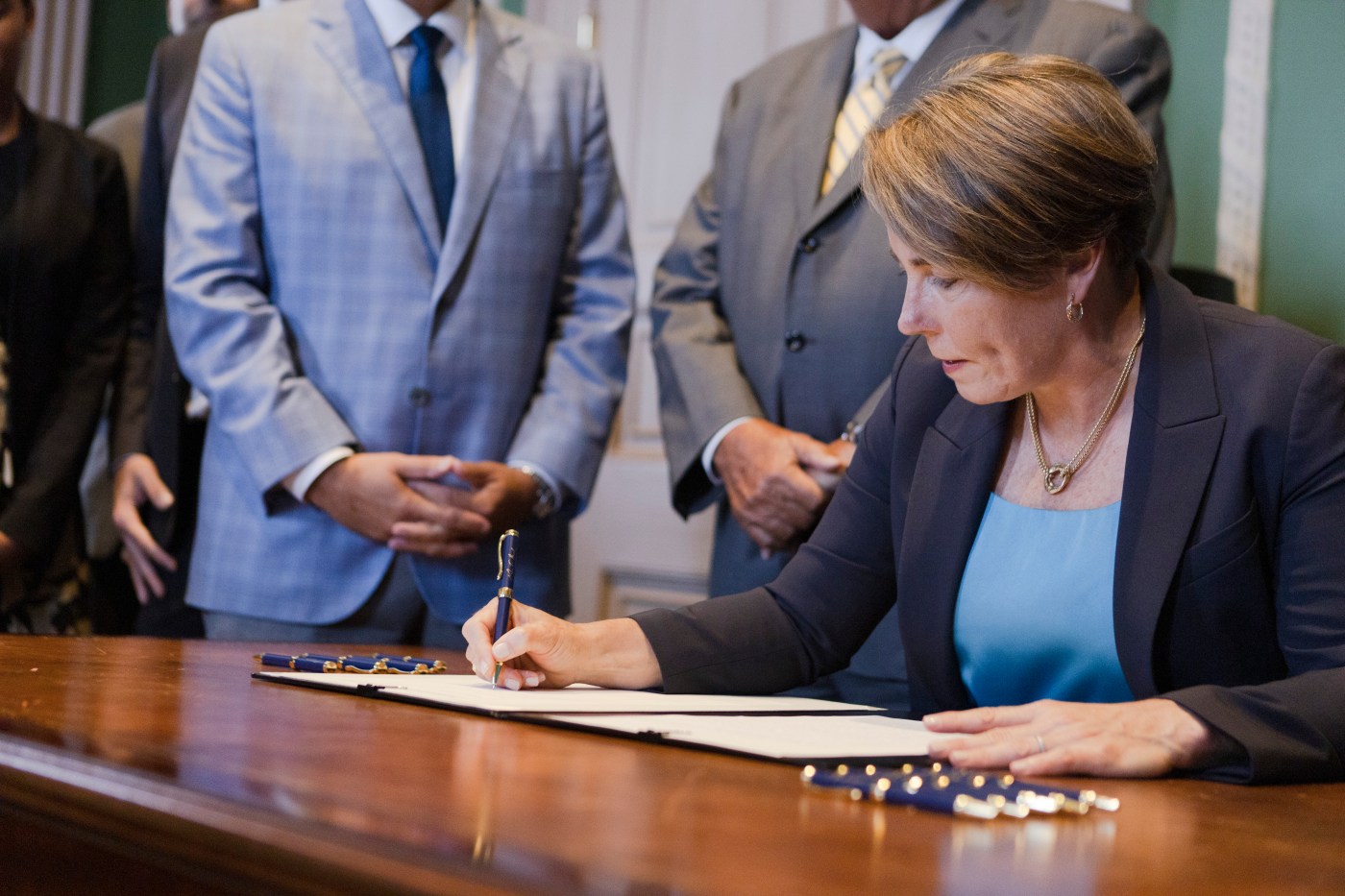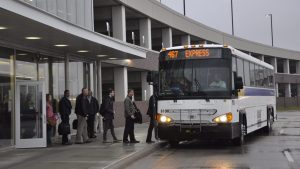
Healey inks $57.8B budget
Gov. Maura Healey gave her OK to sweeping statewide policy changes Monday as part of the overdue fiscal year 2025 budget, signing free community college, online Mass. Lottery products, free rides on regional transit authorities and more into law while making only minor adjustments to the spending plan crafted by House and Senate Democrats.
The governor signed nearly all of the budget the Legislature sent her 10 days ago, approving all but three of the 261 policy proposals lawmakers padded it with.
But she also potentially created more work for the Legislature by trimming $317 million from 60 separate line items in the spending plan with her veto pen as just over 48 hours remain before formal sessions are set to conclude.
That leaves the House and Senate little time to take the votes necessary if they choose to overrule the governor.
The budget, which the governor’s office said carries a $57.78 billion bottom line after Healey’s actions, increases state spending by about $1.7 billion, or about 3.1%, over last year’s budget. It uses about $1.2 billion in one-time revenues to support the outlays during a time of volatile state tax collections and an expected increase in revenues from the state’s new tax on household income above $1 million is also helping the state to boost spending.
“The budget today represents a whole lot of things. One thing it represents is investments on things that we’re already leading on, and making them even better. This includes our number-one ranked schools and our nation-leading child care policy. We’re also tackling our biggest challenges by lowering household costs and improving transportation,” the governor said during a signing ceremony in her ceremonial office Monday afternoon. “We’re doing this all responsibly, fiscally responsibly, staying within our means, and in line with the rate of inflation. We’ve worked hard to make sure that every taxpayer dollar is focused on making life better for all who live and work in our state.”
Legislators packed the budget with policy provisions, authorizing free community college, free rides on regional transit services, and legal online Lottery sales to fund a permanent Commonwealth Cares for Children (C3) grant program that launched during the pandemic with federal dollars — all of which Healey signed off on Monday.
The governor also touted the budget’s investment in her “Literacy Launch” program, which aims to connect all children from three years old to third grade with high-quality and evidence-based reading instruction, as well as its dedication of 1 percent of total spending to environment and energy initiatives.
A Senate initiative to make community college permanently free for all will cost $117.5 million, covering tuition and fees for students. And the House-backed idea of authorizing online Lottery sales is projected to pull in $100 million for the popular C3 early education grant program.
Another section of the budget aims to prevent so-called home equity theft, which refers to a municipality taking more of a property owner’s earned equity than is owed in unpaid taxes and other expenses.
“All of these investments are focused on making life better, making life easier for people in Massachusetts, making it more affordable to live here, to work here, to raise children here. This also makes us more competitive — more competitive for our employers, for economic growth, particularly as we compare ourselves to other states,” Healey said. “So it’s a really important investment, this budget.”
The fiscal 2025 budget is supported by $1.3 billion in revenue generated from the state’s 4 percent surtax on household income above $1 million, on top of the general state revenue foundation of $40.2 billion that lawmakers and the administration agreed to months ago.
The surtax revenue — which is restricted by law to education and transportation uses — is being deployed in the budget to cover tuition-free community college, free RTA rides, the costs of providing universal free school meals in K-12 schools, enhanced minimum aid funding to local schools, additional financial aid for Massachusetts public college and university students, local road and bridge funding, and more.
The fiscal 2025 budget includes a $447 million direct appropriation to the MBTA, which is just one portion of the funding the T receives but represents a significant increase over the current spending plan at a time when the state is considering new ways to finance transportation across the state. There is also $110 million for the state’s 15 regional transit authorities, $40 million of which is projected to be used to allow those agencies to eliminate fares for riders.
House Ways and Means Chairman Aaron Michlewitz said the “record number funding” for the T was a House priority and suggested that the chamber could dive into a more thorough transportation financing conversation when the new legislative term starts in January.
He said funding for the MBTA is “something that we know we still have to continue to work through and something that we’re not walking away from, but actually leaning in on and something that we’re going to be working on going forward.”
A host of legislators joined Healey in her ceremonial office for the budget signing — Senate President Karen Spilka, House Speaker Ronald Mariano, Michewlitz, Senate Ways and Means Chairman Michael Rodrigues, Democratic Reps. Tommy Vitolo of Brookline and Adam Scanlon of North Attleborough, and Weymouth Republican Sen. Patrick O’Connor.
“What we have here is a document that we can all sort of take a bow on,” Mariano said.
“Look, our economy is strong, our bond rating is excellent, we’ve got money in our rainy day fund. But it’s also our responsibility to make sure that we’re being fiscally responsible in a time where there’s still some uncertainty as to economic conditions. And we would rather be in a position of budgeting accordingly now, rather than facing the specter of having to make cuts later, better to plan than to have to make cuts later,” Healey said when asked about the thinking behind her vetoes. “We think these vetoes were vetoes that were well-managed. $317 million, it’s more than last year. But again, we think we’ve done so in a way that is responsible and also doesn’t do harm to the delivery of service.”
— Colin A. Young / State House News Service

